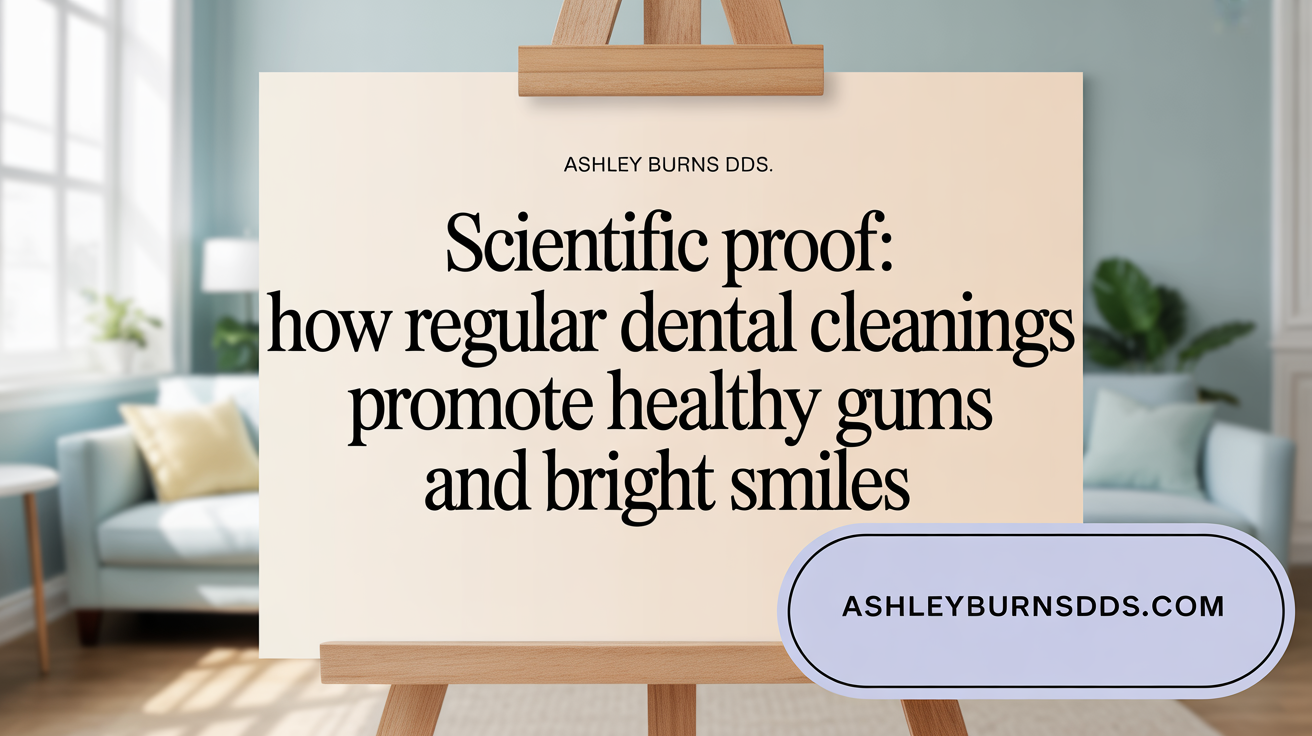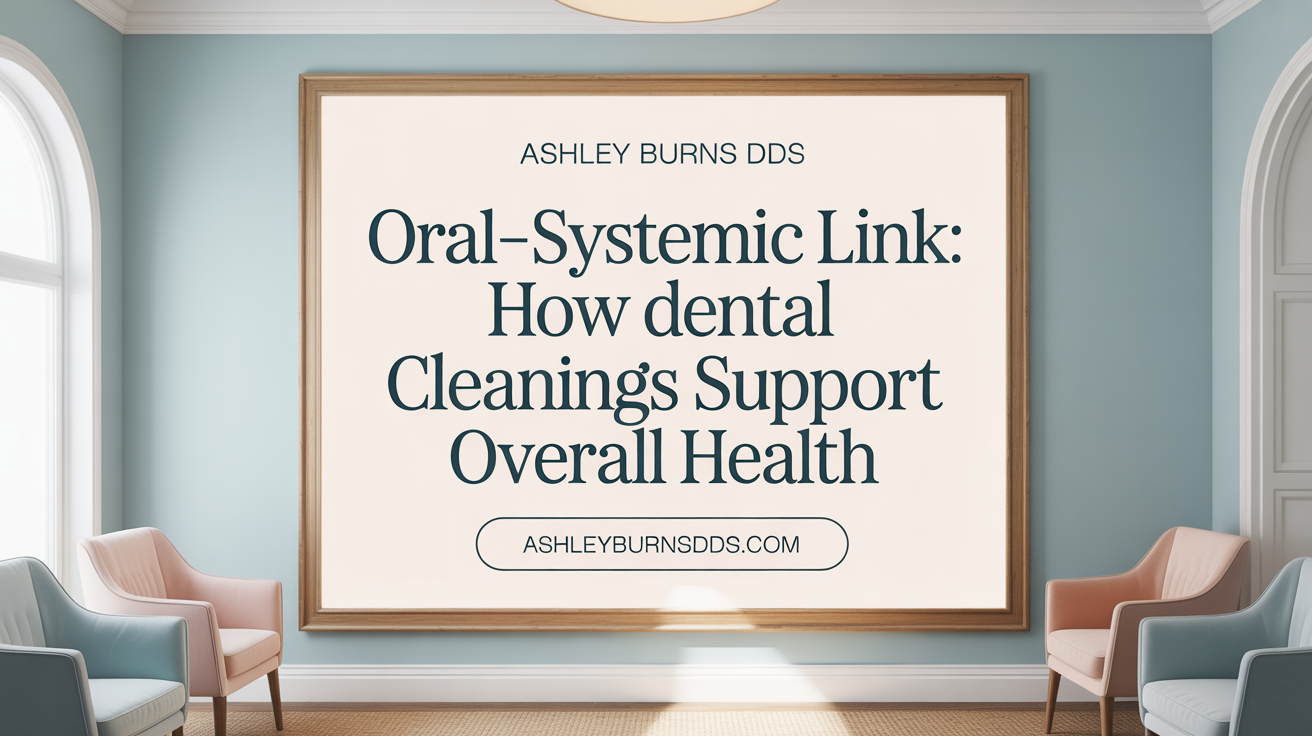Understanding Gum Disease and the Importance of Dental Hygiene
Gum disease, affecting nearly half of adults over 30, is a pervasive condition that can severely impact oral and overall health. This article explores how regular dental cleanings serve as a critical preventative measure against gum disease by removing harmful plaque and tartar, reducing inflammation, and allowing early detection of oral issues. Drawing on scientific data and research, we reveal the mechanisms through which professional cleanings protect the gums, prevent disease progression, and contribute to systemic health benefits.
The Basics of Gum Disease and the Role of Regular Dental Cleanings

What causes gum disease, what are its symptoms and stages?
Gum disease begins with the accumulation of plaque—a sticky film of bacteria—on the teeth and gums. If not regularly removed through good oral hygiene, plaque causes inflammation of the gum tissue, known as gingivitis. Symptoms include red, swollen gums that bleed easily during brushing or flossing. Gingivitis is reversible with professional cleanings and proper home care. If left untreated, gingivitis can advance to periodontitis, a more severe condition where the inflammation extends deeper, causing the gums to pull away from teeth and form pockets that harbor bacteria. Over time, this can lead to the destruction of supporting bone and tissue, potentially resulting in tooth loss.
Why is removing plaque and tartar crucial?
Plaque buildup is the primary cause of gum inflammation and disease. Plaque hardens into tartar, which firmly attaches to teeth and is difficult to remove with brushing alone. Tartar acts as a breeding ground for bacteria, exacerbating inflammation and accelerating tissue destruction. Removing plaque and tartar through routine professional cleanings helps prevent the progression from gingivitis to periodontitis.
How do professional cleanings aid in early detection and reversal of gingivitis?
During dental cleanings, professionals remove plaque and tartar buildup that cannot be eliminated by regular brushing and flossing. These visits also include an examination of the gums for early signs of disease. Early detection allows for timely treatment, which can reverse gingivitis and prevent its progression. Regular cleanings and good oral hygiene practices reduce inflammation, keep bacteria levels in check, and promote healthier gums. These preventive measures are vital for maintaining oral health and avoiding costly, invasive treatments later.
Link between untreated gingivitis and development of periodontitis
If gingivitis is not addressed, it can develop into periodontitis—a chronic, irreversible disease characterized by ongoing inflammation and loss of bone support. The severity of gum issues correlates with a higher risk of developing periodontitis. This progression underscores the importance of early intervention; regular professional cleanings, combined with good home oral care, not only prevent gingivitis but also halt the transition to more severe gum disease. Maintaining this routine helps preserve natural teeth and overall oral health over a lifetime.
| Aspect | Details | Additional Notes |
|---|---|---|
| Primary cause | Plaque accumulation | Bacteria and food debris |
| Symptoms | Redness, swelling, bleeding gums | Early signs of gingivitis |
| Advances | Gum recession, bone loss | Leads to tooth loss |
| Prevention | Brushing, flossing, regular cleanings | Reduces bacteria and inflammation |
| Professional treatments | Scaling, root planing | Remove tartar, deep cleaning |
| Impact on health | Links to systemic diseases | Heart disease, diabetes, stroke |
Overall, consistent oral hygiene, professional cleanings, and early intervention play pivotal roles in preventing gum disease and maintaining overall health.
Scientific Evidence Supporting Dental Cleanings in Gum Disease Prevention

What scientific research supports the connection between dental cleanings and gum disease prevention?
Numerous scientific studies confirm that regular professional dental cleanings are essential in preventing gum disease. These cleanings effectively remove plaque and tartar, which are the primary culprits behind inflammation and periodontal problems. Plaque is a sticky film of bacteria that forms constantly on teeth; if not removed, it hardens into tartar, which can only be eliminated through professional cleaning.
Deep cleaning procedures such as scaling and root planing are particularly impactful for treating and managing more severe forms of gum disease like periodontitis. These procedures target bacteria lurking beneath the gumline, which are otherwise difficult to remove with daily oral hygiene practices alone. By eliminating these bacteria, scaling and root planing help reduce inflammation and prevent the disease from advancing.
Research consistently shows that professional dental cleanings not only reduce bacterial loads but also improve overall gum health. They aid in early detection of potential problems, allowing for timely intervention before significant tissue or bone loss occurs. This early detection and treatment capabilities are essential in preventing the progression from gingivitis, a reversible form of gum disease, to irreversible periodontitis.
Furthermore, studies demonstrate a dose-response relationship between oral hygiene practices and gum disease risk. Regular cleanings, combined with effective home care, significantly lower the chances of developing severe periodontal disease, contributing to long-term oral health. Overall, scientific evidence strongly supports that routine dental cleanings are a cornerstone in the prevention and management of gum disease, with benefits extending to overall systemic health.
Maintaining Periodontal Health Through Routine Oral Cleaning Practices

How do routine oral cleaning practices impact periodontal health?
Routine oral cleaning practices are essential for maintaining healthy gums and preventing gum diseases like gingivitis and periodontitis. These habits effectively control bacterial growth, which is the primary cause of gum inflammation and infection.
Regular brushing, especially with fluoride toothpaste, twice a day for at least two minutes, helps remove plaque— a sticky film of bacteria that forms on teeth after eating. Studies show that consistent brushing can reduce the risk of periodontitis by approximately 34%. Flossing daily complements brushing by clearing away plaque from between the teeth and under the gumline, areas that brushes often miss. This continuous removal of plaque is crucial as it prevents the progression of gingivitis to more severe, irreversible forms like periodontitis.
Professional dental visits for cleanings are equally important. During these visits, dentists remove tartar— hardened plaque deposits that cannot be eliminated through regular home care. Regular cleanings help reduce bacterial toxins, inflammation, and the risk of tissue and bone destruction associated with gum disease.
In addition to brushing and flossing, using antimicrobial mouthrinses and avoiding smoking further reduces bacteria and inflammation, thereby strengthening periodontal health. Good overall oral hygiene practices not only safeguard against gum disease but also decrease tooth loss, systemically lowering risks associated with cardiovascular disease, diabetes, and other health conditions.
In summary, diligent daily oral hygiene combined with routine professional care forms a fundamental strategy in maintaining healthy gums and preventing the development of serious periodontal conditions.
Deep Cleaning Procedures: Effectiveness in Reducing Gum Disease Risk

What is periodontal disease and how do dental cleanings help mitigate its risks?
Periodontal disease is a chronic inflammatory condition affecting the gums and structures supporting the teeth. It is primarily caused by bacterial infection resulting from plaque accumulation on the tooth surface. If untreated, it can lead to gum recession, bone loss, and ultimately tooth loss.
Professional dental cleanings, particularly deep cleaning procedures such as scaling and root planing, play a significant role in managing this disease. These treatments involve the meticulous removal of plaque, tartar, and bacteria from beneath the gumline, targeting areas inaccessible through regular brushing and flossing. This removal reduces bacterial load, decreasing inflammation and preventing tissue destruction.
Scaling and root planing help to smooth rough spots on the roots of teeth, discouraging the re-attachment of harmful bacteria. Regularly scheduled deep cleanings can effectively interrupt the progression from early gum inflammation to more advanced, destructive periodontitis.
By eliminating bacteria below the gumline, these procedures promote tissue healing and help preserve the natural teeth. Combined with good oral hygiene practices and ongoing maintenance, scaling and root planing are proven strategies for controlling periodontal disease and reducing its systemic health risks.
Maintaining consistent dental visits ensures early detection of gum issues, enabling prompt intervention and minimizing long-term damage. Overall, deep cleaning procedures serve as a cornerstone in the effective management of periodontal health, contributing to healthier gums and sustained tooth retention over time.
Evidence-Based Benefits of Regular Cleanings for Preventing Gum Disease Progression
Regular dental cleanings offer significant protection against the advancement of gum disease. These professional procedures efficiently remove plaque and tartar buildup that daily brushing and flossing may not fully eliminate, reducing bacterial presence that causes inflammation and infection.
By removing the harmful deposits that lead to gingivitis, cleanings serve as an effective preventive measure, halting the progression to more severe forms like periodontitis. Early detection of gum issues is also facilitated during these visits, enabling prompt intervention before irreversible damage, such as bone loss or tooth loss, occurs.
Besides local benefits, regular cleanings contribute to systemic health. Evidence links improved periodontal health with lowered risks of heart disease, diabetes complications, and respiratory infections. Maintaining good oral hygiene through routine professional care is thus essential not only for oral health but also for overall well-being.
In summary, adhering to recommended cleaning schedules is crucial for preventing gum disease's escalation and supports broader health outcomes. The consistent removal of plaque and early disease detection underscores the importance of routine dental visits in sustaining oral health and preventing disease progression.
Linking Gum Disease, Dental Cleanings, and Systemic Health Risks

How do regular dental cleanings contribute to reducing the risk of gum disease?
Regular dental cleanings are fundamental in preventing gum disease by removing plaque and tartar buildup, which are primary contributors to gum inflammation and infection. Professional procedures such as scaling and root planing target these deposits, especially beneath the gumline, where daily brushing and flossing may not reach. These cleanings not only help keep gums healthy but also enable dentists to identify early signs of gum disease, such as bleeding or swelling, allowing for prompt treatment.
For individuals with higher risk factors, such as smokers and diabetics, increased frequency of cleanings helps better control their condition and reduce inflammation. Overall, consistent professional cleanings, combined with diligent home care—brushing twice a day with fluoride toothpaste and daily flossing—form a powerful defense against the progression of gum disease. This preventive approach benefits overall health by decreasing the risk of bacteria entering the bloodstream, which has been linked to systemic conditions like heart disease and stroke.
Association between gum disease and cardiovascular diseases, diabetes, stroke
Studies have established close links between gum disease and several systemic health problems. People with periodontal disease are approximately 28% more likely to suffer a heart attack and three times more likely to have a stroke. The persistent bacteria and inflammation from gum infections can enter blood vessels, leading to blockage and increased cardiovascular risk.
Diabetics are especially vulnerable, with nearly 60% experiencing gum disease. Poor gum health can complicate blood sugar control, creating a two-way relationship where each condition worsens the other. Maintaining healthy gums through regular dental visits and hygiene practices can help manage diabetes better and reduce cardiovascular risks.
How managing gum disease reduces systemic inflammation
Controlling gum disease through professional cleanings and good oral hygiene effectively reduces systemic inflammation. Chronic gum infections trigger immune responses that contribute to arterial plaque buildup, increasing the risk for cardiovascular disease. By eliminating bacteria and combating inflammation at its source, dental care can lessen the burden on the immune system and improve overall systemic health.
Scientific findings connecting oral hygiene to systemic health
Research highlights a graded relationship between poor oral hygiene, gum disease severity, and systemic health risks. Systematic reviews and epidemiological studies show that regular brushing, flossing, and professional cleaning lower the likelihood of developing severe gum disease. These practices reduce harmful bacteria in the mouth, which, if unaddressed, can invade the bloodstream, escalating risks for heart attacks, strokes, and even complications in pregnancy.
Implications for preventive healthcare through dental visits
Routine dental visits are vital preventive measures. Dentists can detect early signs of gum disease and other oral health issues, allowing for less invasive and more effective treatment. Regular cleanings can also diminish systemic bacterial load, lowering the chance of bacteria lodging in arteries or brain vessels—an important factor in preventing cardiovascular events and strokes.
Incorporating oral health checks into primary healthcare protocols emphasizes a holistic approach to well-being. As evidence suggests, maintaining good oral hygiene and regular professional cleanings not only protects teeth and gums but also promotes systemic health, reducing the risk of life-threatening conditions linked to inflammation and bacterial invasion.
| Aspect | Impact | Additional Details |
|---|---|---|
| Gum disease and cardiovascular risk | Increased risk | People with periodontal disease are more susceptible to heart attacks and strokes |
| Diabetes connection | Higher prevalence | Poor gum health complicates blood sugar control and vice versa |
| Preventive benefits | Reduced systemic inflammation | Regular cleanings lower bacteria and inflammatory responses in the body |
| Healthcare strategy | Integrative approach | Oral health assessments should be part of routine health checkups |
| Overall health impact | Long-term | Good oral hygiene contributes to reduced chronic disease burden |
This interconnectedness underscores the importance of dental care as a vital component of overall health maintenance. Regular professional cleanings, along with good daily hygiene practices, are proven strategies to lower systemic health risks associated with gum disease.
Preventative Strategies and Public Health Perspectives on Gum Disease
Why is early detection and tailored dental care intervals important?
Regular dental checkups enable early identification of signs like gum inflammation and bleeding, which are indicators of gingivitis. Dentists can then prescribe personalized cleaning schedules to prevent progression to periodontitis. Studies show that supportive periodontal care every 3 to 4 months significantly reduces tooth loss over years, emphasizing the value of individualized treatment plans.
How do lifestyle factors like smoking and diet influence gum health?
Smoking substantially heightens the risk of gum disease, with over 60% of current smokers affected. It impairs immune response and hinders healing post-treatment. Diet also plays a role; high sugar intake fuels plaque bacteria, while adequate nutrition supports immune defenses. Quitting tobacco and reducing sugar consumption are critical steps for maintaining healthy gums.
What is the role of public health measures such as water fluoridation?
Community water fluoridation is recognized globally as an effective strategy to curb dental caries, a precursor to gum problems. Fluoride in water helps strengthen enamel and inhibits decay, indirectly supporting gum health. The ADA endorses water fluoridation as an essential public health tool to promote oral health at the population level.
What are WHO’s strategies and priorities for preventing oral diseases?
The World Health Organization promotes a comprehensive approach focusing on prevention, integration into primary health care, and reducing disparities. Its strategic action plan for 2023–2030 emphasizes raising awareness, improving access to care, and implementing policies like community water fluoridation. These initiatives aim to reduce the global burden of oral diseases and promote healthier populations.
| Strategy Area | Description | Impact |
|---|---|---|
| Early detection | Routine screenings to catch problems early | Prevents progression to severe disease |
| Lifestyle modifications | Quitting smoking, healthy diet | Reduces risk factors |
| Public health measures | Water fluoridation, education campaigns | Broad community benefits |
| Integrated care | Incorporation into primary health services | Improves access and outcomes |
The Critical Role of Regular Dental Cleanings in Gum Disease Prevention
Regular dental cleanings emerge as an indispensable tool in preventing gum disease by effectively removing plaque and tartar that daily oral hygiene cannot fully eliminate. Supported by a robust body of scientific research, these professional treatments not only reverse early gum inflammation but also prevent progression to debilitating periodontitis, preserving natural teeth and enhancing overall health. Furthermore, managing gum disease through routine cleanings contributes significantly to reducing systemic health risks, including cardiovascular disease, diabetes, and stroke. Integrating consistent dental care with good home hygiene practices and healthy lifestyle choices forms a comprehensive strategy to maintain periodontal and systemic well-being. Public health initiatives promoting oral hygiene and access to dental care are essential to combat the widespread burden of gum disease globally. Ultimately, regular dental cleanings represent a cornerstone of preventive oral healthcare that safeguards smiles and supports lifelong health.
References
- About Periodontal (Gum) Disease | Oral Health - CDC
- The association between oral hygiene and periodontitis
- Home Oral Care - American Dental Association
- How Long Can You Keep Your Teeth with Periodontal Disease ...
- The Facts About Periodontitis (Gum Disease) - HUSKY Dental - ctdhp
- How Regular Teeth Cleanings Help Prevent Gum Disease
- Oral health: A window to your overall health - Mayo Clinic
- Gum disease: By the numbers - NIH MedlinePlus Magazine
- Disparities in Preventive Oral Health Care and Periodontal ... - CDC
- Gum Disease Risk Factors - American Academy of Periodontology
